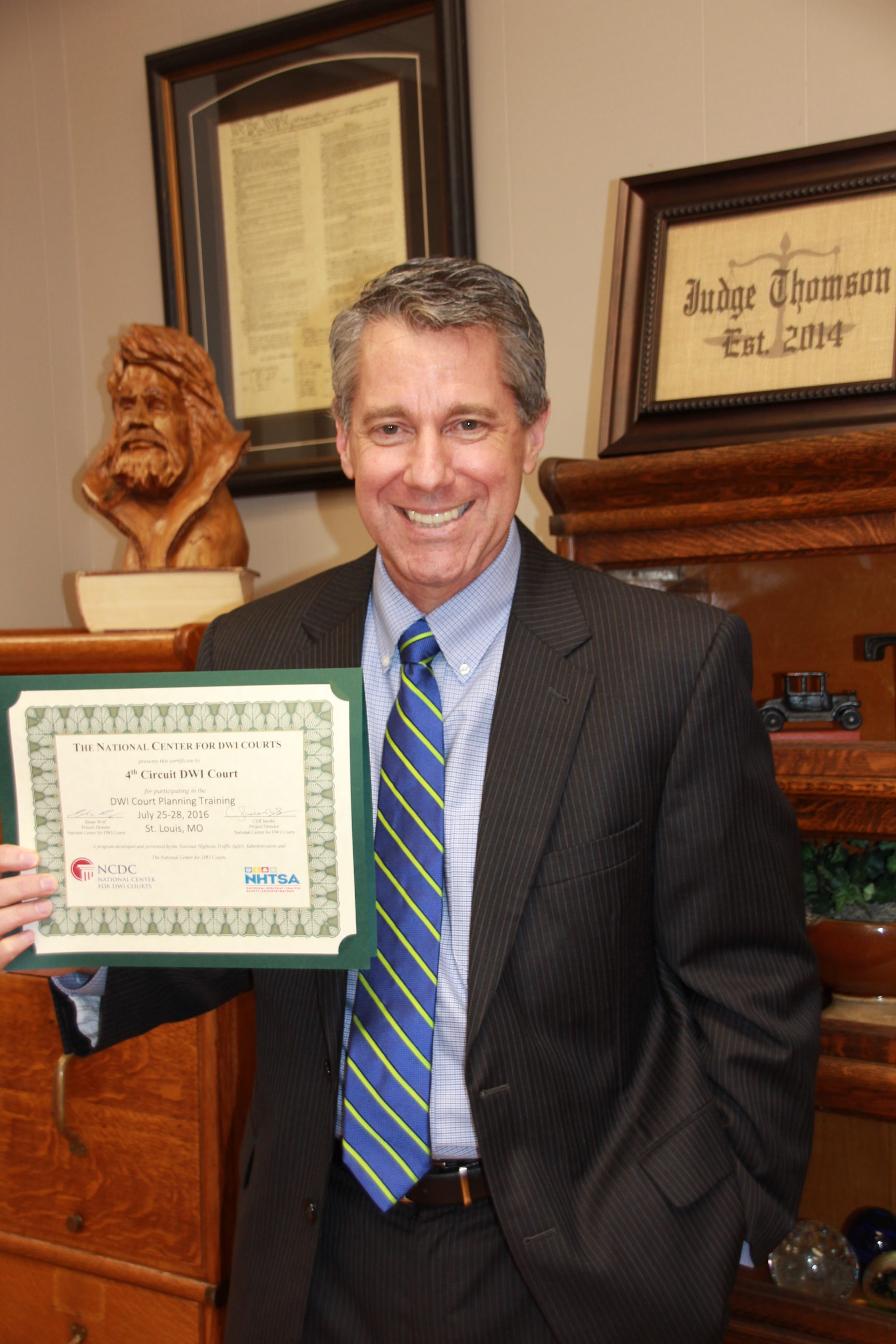Associate Circuit Judge Doug Thomson recently announced that the 4th Circuit DWI Court is open and ready for business.
The DWI Court, like the more familiar Drug Court, is a treatment model that gives alcohol offenders the opportunity to be rehabilitated instead of serving time in the penitentiary. This method, being tried throughout the nation, is also a less expensive way to address the problem of alcohol offenders.
“This option gives them the opportunity to fix the underlying problem,” said Thomson. “Jail punishes, but doesn’t fix the problem. We see people come back.”
The 18-month program has a 1.5 percent graduate recidivism rate.
Attendees have the opportunity to obtain a limited driving privilege (LDP) certification toward the end of the 18 months.
“The biggest deal to me is the opportunity to change a life,” Thomson said. “It’s worth the effort our team members put in it to see the changes in these people’s lives.”
The program is intense. On a weekly basis, attendees must attend individual and group counseling sessions, probation officer visits, random drug and alcohol testing, random home visits, AA meetings and community service and also meet twice a month in court.
“As they move through the program, it’ll become less intense,” Thomson said. “About the one year mark, they might be eligible to get an LDP.”
Thomson classified many of the people who go through the program as “folks who never have had a wake-up time in the morning, no job, no plan for tomorrow.
“It’s a complete metamorphosis to complete the program and become a productive citizen, all the while being cheaper for the state,” he said.
The program is funded by the Missouri Department of Mental Health and grants and also requires participants to pay. Part of the fees are on a sliding scale, while the program entrance fees and program phase up fees are fixed. The program is endorsed by the National Defense Council, Missouri Prosecutors Association and by judges.
The DWI Court will serve Nodaway, Holt, Atchison, Gentry and Worth counties. The team overseeing DWI Court is not the same team working with Drug Court. DWI Court team members are Defense Attorney Sam Scroggie, Atchison County Prosecutor Brett Hurst, Maryville Public Safety Officer Mike Stolte, Probation and Parole Officer Melinda Adams and Thomson who leads the program. Family Guidance Center, Maryville, provides the counseling.
“I extend a lot of kudos to Sam Scroggie,” Thomson said. “He’s completely volunteer and is not reimbursed for his time.”
The team takes a holistic approach. They meet weekly to talk about who to admit, who’s having problems, who’s ready to go to the next phase of the program and who’s going to graduate.
Stumbles are understood, said Thomson, but not condoned. Participants who have trouble maintaining program standards are held back and not able to earn program rewards. If the problems are big enough, the offender will be kicked out of the program. Those removed from the program are sent to criminal court as a probation violator. At that time, the expectation is that the offender will serve their maximum sentence.
DWI Court is a last chance opportunity before prison.
Thomson and his team have been working on setting up a local DWI Court for a year. Much of that time was spent obtaining the certification needed to implement and run the program. Team training is normally held in Reno, NV, but the State of Missouri paid the trainers to come to St. Louis to hold certification classes in July. This saved the 4th Circuit Court team money and time.
Thomson said for the program to work, there must be cooperation from the defense council, judges and prosecutors. One statistic that inspires him to promote DWI Court is that 31 percent of traffic fatalities are caused by those impaired by alcohol.
Thomson concluded the reason that he pursued the development of the DWI Court was local treatment will equal success in most cases.
“Remaining addicted is easier than trying to change,” he said. “Treatment plus accountability module equals success.”
The treatment court module is not just a punishment, but a reward.
These people are “not told good job because all they’ve ever been is in court.”
To change this perception, Thomson said, “We’ll be looking to the community for help to make small rewards. The concept of going to do activities other than alcohol-related ones is foreign.
“Success stories have offered their stories to us,” said Thomson. “Graduates of other programs offer their help to our team. We will find a place for them to help.”




Facebook Comments